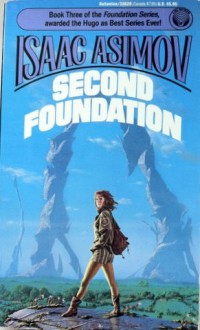Second Foundation
by:
Isaac Asimov (author)
When the Galactic Empire died, the great psychohistorian Hari Seldon set up the Foundation to preserve knowledge and lead men to a new empire after a thousand years. Now Seldon's plan seemed ended -- ruined by the mutant mind power of hte Mule. But there was a Second Foundation "at the other end...
show more
When the Galactic Empire died, the great psychohistorian Hari Seldon set up the Foundation to preserve knowledge and lead men to a new empire after a thousand years. Now Seldon's plan seemed ended -- ruined by the mutant mind power of hte Mule.
But there was a Second Foundation "at the other end of the galaxy" set up to protect the plan. The Mule had failed to find it the first time, but now he was sure he saw where it lay.
The men of the Foundation also sought its location. Some of their finest minds were being dominated -- and not by the Mule. They sought the Second Foundation to prevent its taking them over.
They saw only one place where it could be. And young Arkady Darrell, fourteen years old and desperate with fear, knew she had discovered the terrible secret.
Or had she?
źródło opisu: okładka
źródło okładki: zdjęcie własne
show less
Format: papier
ISBN:
0345336291
Publish date: marzec 1989 (data przybliżona)
Publisher: Del Rey Books
Pages no: 282
Edition language: English
Series: Foundation (Publication Order) (#3)

The completion of the original Foundation trilogy sees the masterplan of Hari Sheldon righted by his secret safety valve. Second Foundation by Isaac Asimov sees first the Mule and then the First Foundation itself looking for Sheldon’s second institution because they felt it was a threat, while the ...

There are two sayings about reading literature that I hear often. The first is that the person just can’t get into the book. The second is that I should wait 1000 pages until the character killed in the epilogue for A Storm of Swords for a cheap twist, is connected to the larger picture. True, these...

This was by far my favorite book in the original trilogy. This book was much easier to follow in comparison to the first two books, because instead of covering over a hundred years, the events all take place relatively close to each other and the narration focuses on the same characters. There were ...

Great ending to the original trilogy.

I'm starting to realize that the lasting appeal of this series is less with the stories themselves and more with the ideas they represent. Psychohistory and all of its ramifications is fascinating, but the characters and conflicts that are going on in the stories themselves are less so. Part of it, ...






 10 years ago
10 years ago